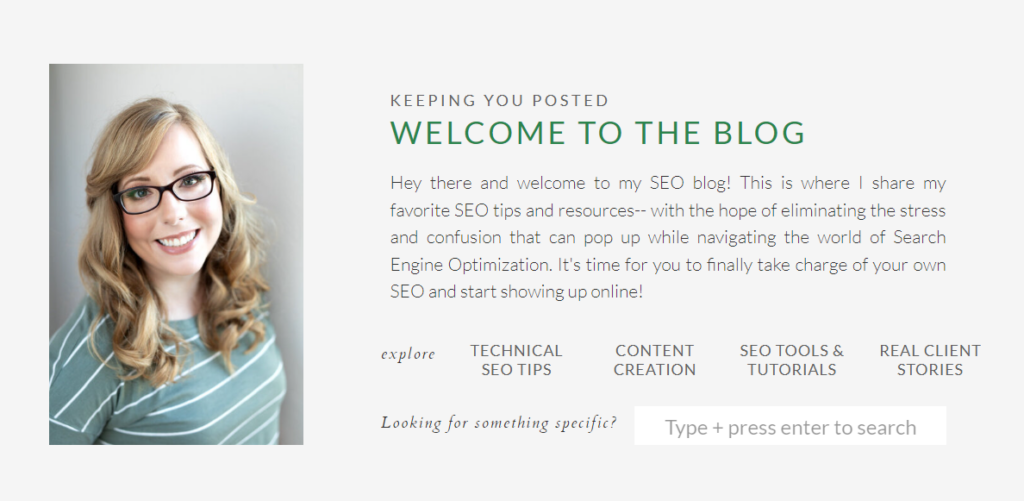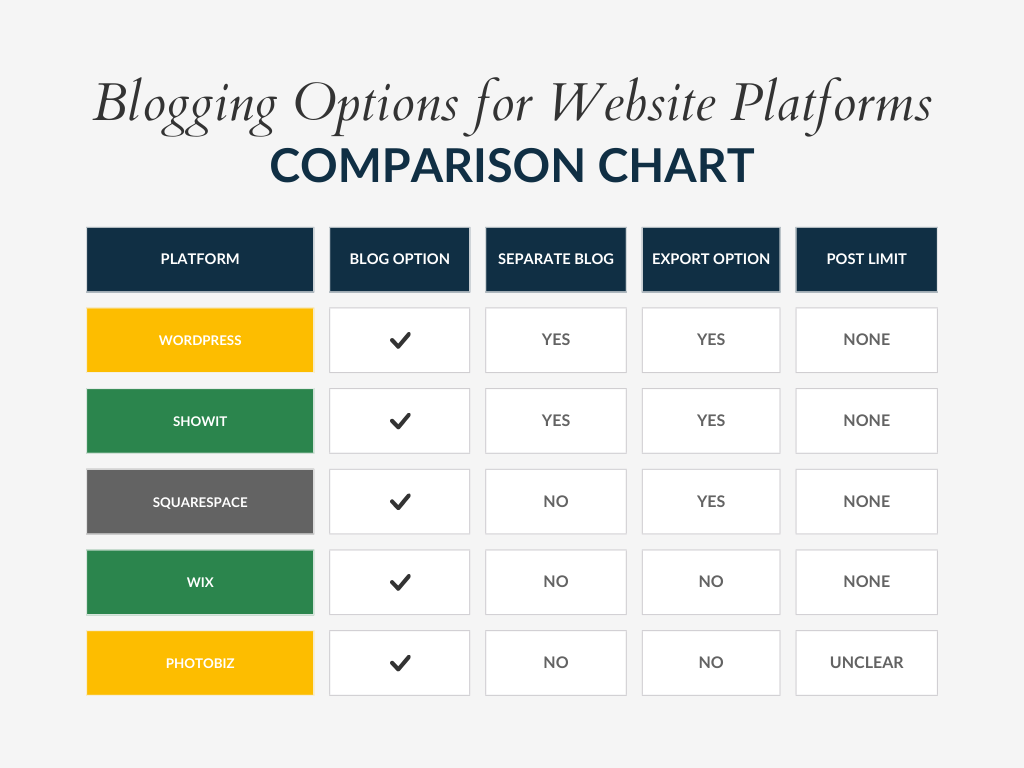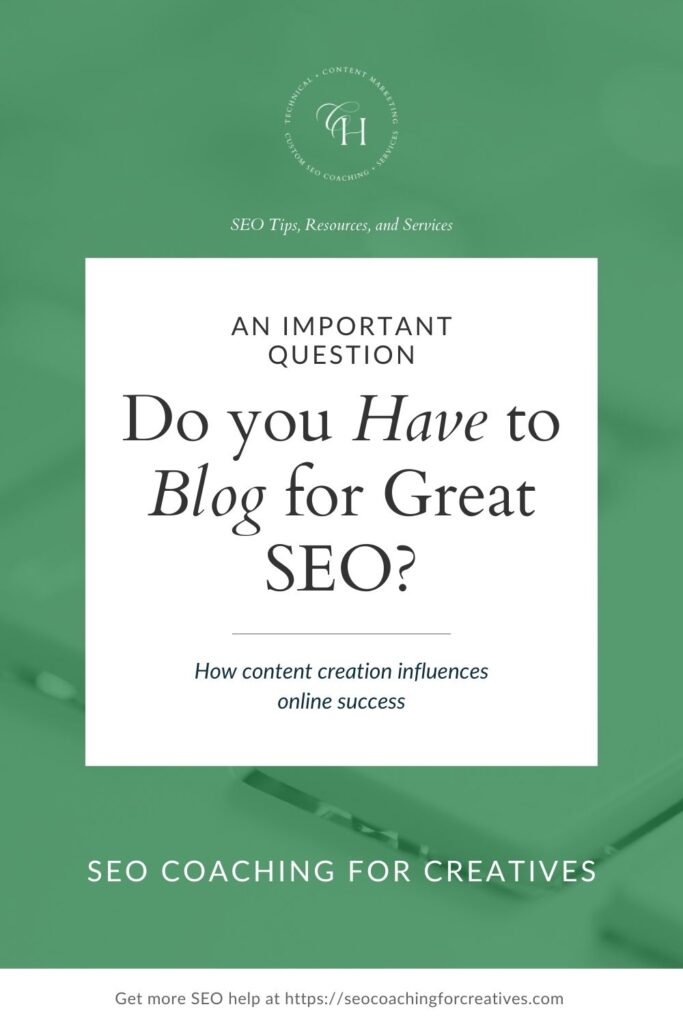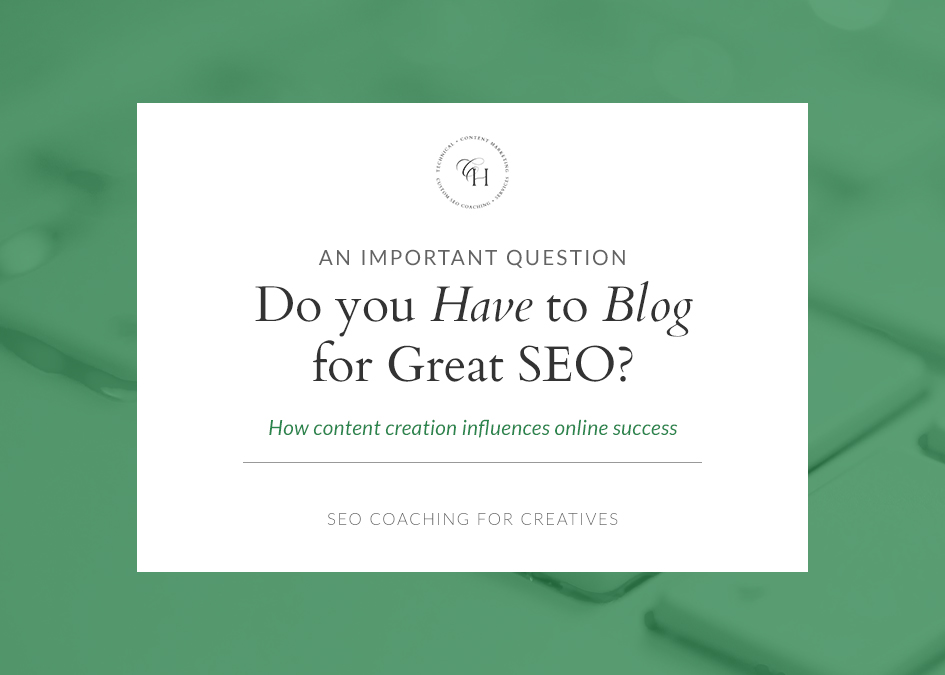Search Engine Optimization (SEO) can’t happen without words being present on your site. Period. In order for Google or another search engine to understand what your website is about– what you want to be found for online– you have to provide it with information. While words are absolutely necessary for ranking, do you have to blog for SEO? That’s the question we’re going to answer today!
What is Blogging
A blog is defined as “a regular feature appearing as part of an online publication that typically relates to a particular topic and consists of articles and personal commentary by one or more authors.” When blogs first came about in the early 1990’s, they were used primarily as a sort of online journal or diary. The writer typically shared their own personal ideas and stories. But having a blog didn’t necessarily mean that you had an official website presence or business.
Today, blogs are still used for personal posting and documenting life as it happens, but the primary use of blogging has definitely changed. When I hear the word “blog” now, I think of it as an informational library that’s an extension of the person or business who created it. You’ll generally find a website associated with that blog, as well. Blog posts mainly consist of long-form, written content (aka, lot of words).
You can find my recommendations for how often you should blog on your website here.

Take this blog as an example! I have my regular, full website for SEO Coaching for Creatives. Then I have this blog connected to my website via my domain. What I talk about in this blog centers around helping others learn, understand, and implement SEO. Within my blog, I’m the only one writing these posts. But for larger companies, they may have several writers for their blog. There are lots of independent contractors that you can hire specifically for the purpose for writing blog posts for you. –> That’s how important blogging has become!
Now that you know what blogging is, the next question you probably have is this: Do I need to blog for SEO?
Is Blogging Important for SEO?
So we’ve already established that search engines rely on words throughout your website in order to place your site appropriately within search results. And blogs are used as a means of writing posts on your website that are primarily word/text-driven. This is why blogging is so highly recommended as a means of content creation for website owners who want to be found online. You might be thinking, “But I’ve got lots of words on all of my website pages. So do I really need to blog for SEO?”
Enter the catchphrase of SEO professionals: It depends.
Content Creation and Authority
If you are trying to rank your website for a keyword phrase that has quite a bit of search volume and healthy competition, then ranking well is going to take more effort. Think about this from Google’s perspective.
Let’s assume that all things are equal in terms of on-page optimization. If Google is trying to decide between two websites that are focused on the same topic/service/product… And one website has 35 pages all talking about that subject while the other website has only 7 pages… Which website is Google going to view as being more helpful and authoritative for its searchers?

The website with 35 pages, right?
Additionally, chances are pretty high that the larger website also has more backlinks (referrals linking to it from other websites) simply because it has more content online to be found and referenced.
If you were visiting these two websites, which site would you probably spend more time on? The site that has more content for you to dive into.
In a more competitive situation, I would say that blogging is very important for SEO. On the other hand, if you have a website that’s geared towards a topic/service/product that isn’t very common and the competition is pretty low, then your SEO success is less reliant on blogging. However, I wouldn’t recommend ignoring content creation altogether.
Why Content Creation Matters to SEO
The end goal of content creation is to increase your visibility. The more people that know about your business, the service or product you provide, the higher your chance is of making sales or getting bookings.
Each piece of content that you create allows you to increase your visibility by being found for multiple topics/services/products. Let’s think through an example.
Pretend you’re a local bakery shop. You’re really well-known in your area for creating incredible birthday cakes. Knowing that they bring you a lot of business, most of your website content is centered around your birthday cake products. However, you also make custom wedding cakes, too, and they’re much more profitable. But if people can only find your birthday cake photos and information on your website… And you don’t have a page about wedding cakes on your website… Then how can engaged couples ever discover you when searching online for a wedding cake shop? They can’t!
Creating content on multiple topics/services/products that relate to your business provides you with the opportunity of being found for more than just one thing online. The more eyeballs that come to your website, the higher your income potential becomes.
Not sure whether the topic you have in mind is a worthwhile idea to write about? Read my post here that talks you through what good keyword search volume looks like and what to do if the search volume is low or zero!
Other Forms of Content Creation that aren’t Blogging
Content creation allows you to do a several things:
- Connect with your audience or target customer
- Show your experience, expertise, and authority
- Build trust with your audience or target customer
- Spread the word about your service or product
Blogging allows you to accomplish all of these things; however, writing isn’t the only form of content creation that can grow your business.
I get it. Writing may not be your thing. And while I’d advise you not to think of blogging in the formal sense (like writing a formal essay in your high school English class), there are other ways to create content that may better align with you.
Video Content
Currently, YouTube is the second largest search engine out there. And do you know who owns YouTube? Google, the first largest search engine! Video content is an extremely powerful marketing method. Viewers can see your face, hear your voice, and get a real sense of your personality and approach.

Audio Content
If you prefer speaking over writing but aren’t a fan of showing your face on camera, then consider a form of audio content creation like podcasting. Not only can you run your own podcast, but you can also be a guest on other people’s podcasts! This is also a fantastic way to network with others in your industry and grow your audience.

Social Media Content
You might be wondering where social media comes into play here. Social media platforms like Instagram, Facebook, and TikTok can be very useful in marketing your business. And since they’re very mobile-oriented, the content creation process feels much more approachable than creating videos for YouTube or audio recordings for a podcast.

I’ll never tell a business owner to ignore social media if they want to use it. But I do want to throw in a few words of caution. First, you don’t own those platforms. Unlike your blog, videos you make for YouTube, or audio you record for podcasts, social media content isn’t something that most business owners keep backups of. That means that if your account gets hacked or the platform shuts down, then you lose all of the content hosted on that platform.
Second, the frequency with which you have to show up on these platforms AND how often the platforms change their algorithm can be stressful. Most social platforms reward accounts that show up a lot and use their platform frequently. Over time, reaching your intended audience with your posts has become more elusive and instead encourages you to spend money on ads in order to be seen. It’s not as simple as using the right hashtags anymore.
If you want to use social media to market you business, go for it. But PLEASE, do not let these platforms be your only marketing method!
My Content Marketing Recommendation
The recommendation that I have for content marketing revolves around the concept of repurposing. As business owners, we’re under a lot of pressure to show up in “all the places.” This can force us to stretch ourselves too thin and, ultimately, not show up anywhere.
Start with 2 or 3 platforms that you want to show up on. Do yourself a favor and make sure that you actually enjoy using at least one or two of them. As you get into a rhythm marketing on these platforms, then you can add more to your plate later if you want to.

One of these platforms needs to be based on long-form content (like blogging, videos, or podcasts). For myself, I write on my blog for SEO. Then I take that piece of long-form content and repurpose it for the other platforms that I want to show up on, like Instagram and Facebook.
Use that one piece of really stellar, detailed, intentional content to guide all of your other pieces of content. This saves you so much time and stress. You do not need to talk about something entirely different on every single platform!
Curious to know how often you should blog on your website? You can find my blogging frequency recommendations here!
How to Check your Blog Rankings
You can use a free tool like Google Search Console (GSC) to find out which blog posts or pages on your website are bringing in the most traffic. This is my favorite free SEO tool to use and I’ve already made a tutorial for you that walks you through how to set up Google Search Console step by step.
GSC can also tell you what keywords that page or post is ranking for so that you can determine if your content is matching up with your SEO goals.
How to Get a Blog
Many website platforms offer you a blog for SEO and content creation. While this seems like the obvious route to take, I do want to offer a few words of caution (again lol). Many website platforms that offer a blogging option tie your blog to their specific platform. They call it an integrated blog. This means that if you ever decide to switch website platforms, there is a high probability that you will lose all or most of your blog posts. This can be devastating to your SEO and quite the headache to deal with during a transition.
I’ve created a handy chart here that shows you how some of the big website platforms stack up in regards to offering a blog for SEO.
*I would still recommend reaching out to a platform’s support team before you move to it or leave it to double-check this information. Things can change! 😉

The ability to export your blog posts is why, for now, WordPress.org, Showit, and Squarespace are my top website platform recommendations. Wix would be on that list too if they allowed exporting; maybe that will change down the road.
So there you have it: do you need to blog for SEO? Honestly, I don’t think I’d ever recommend not blogging for SEO! But if writing content isn’t for you, there are other options you can look into to market your business. Curious as to whether or not your blog posts are well-optimized, SEO-friendly, and ready to overtake your competition? Sign up for a Content Audit with me to make sure your website and blog are actually helping to grow your business and be found online!

How Often Should You Blog for SEO: Blogging Frequency
How Long Should a Blog Post Be? Word Count


Always cheering you on,
Christy
Be the first to comment